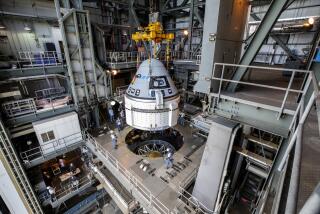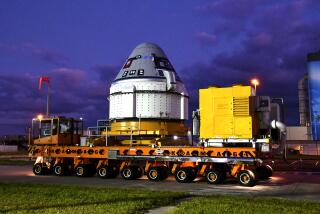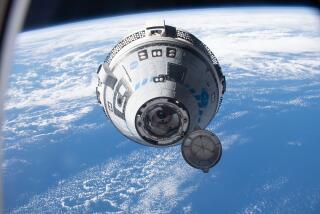Atlantis to Dock With Mir Despite Steering Fluid Leak
- Share via
KENNEDY SPACE CENTER, Fla. — Space shuttle Atlantis sprang a leak in its steering system during liftoff early Friday, but NASA said the problem isn’t serious enough to cut short a docking with the Russian space station Mir.
NASA said neither the crew nor the shuttle was in any immediate danger from the leak of hydraulic fluid, and Mission Control assured astronaut Shannon Lucid and her five crew mates that the docking was still on. Lucid is supposed to be dropped off at Mir, along with more than 5,000 pounds of supplies, for a five-month stay.
As the shuttle sped after Mir for a linkup tonight, flight controllers pored over the data to make sure the leak would not worsen and that the escaped fluid, nonflammable but corrosive, would not damage any equipment.
The leak was in one of three identical hydraulic systems used to control wing flaps, the rudder and landing gear. Only two systems are needed to land.
Lead flight director Bob Castle said the red, oily fluid began leaking a few minutes before Atlantis left the ground, but the seepage was too slight to be detected by ground-control computers. The launch would have been scrubbed had the leak been detected, he said.
Castle said there is no evidence of further leakage, and the fluid is believed to be confined to the engine compartment in the form of a harmless, oily film covering shuttle components.
Flight managers decided to allow Atlantis to remain docked with Mir for the full five days planned rather than dropping off Lucid and returning as soon as possible.
NASA and Russian space officials are still discussing any risk the leaked fluid could pose for Mir. “We don’t expect a problem,” Castle said.
If a hydraulic system leaks excessively and the leak cannot be isolated, NASA rules stipulate that a shuttle should complete its major objectives and then return to Earth.
But Castle said the rules are likely too conservative and don’t cover Atlantis’ specific problem.
Two weeks ago, a computer circuit involving the steering system failed on shuttle Columbia, and NASA bent its rules to keep Columbia in orbit an extra day.
Although Atlantis has docked twice before with Mir, this is the first time the shuttle is carrying an American astronaut to live on the station, and it marks what is supposed to be the beginning of a continuous U.S. presence in space for the rest of this decade and next.
Five more astronauts are expected to follow Lucid to Mir, one at a time, during the next two years. By then, construction of the international space station should be underway, with Americans and Russians living there full time.
Lucid, 53, a biochemist, would be the second American to live on Mir, and the first American woman.
She is scheduled to return to Earth in August. By then, she will have broken the U.S. space endurance record of nearly four months set last year on Mir by NASA astronaut Norman Thagard.
More to Read
Sign up for Essential California
The most important California stories and recommendations in your inbox every morning.
You may occasionally receive promotional content from the Los Angeles Times.













